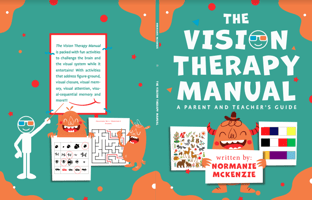My name is Normanie McKenzie Ricks and I am an Occupational Therapist that has been practicing for over 13 years. I have worked in lots of different settings practicing my "craft."
After serving in the United States Navy as an active duty Occupational Therapist, something that I valued learning the most was learning to treat vision issues after a traumatic brain injury, or concussion. After working in the school system and learning to administer certain assessments such as the Beery Visual Motor Integration Test, I learned to appreciate that a lot of children were struggling in the classroom due to visual processing and visual perception issues.
Therefore, the interest in vision and how it affects function became my passion. Every single activity that we do in life involves vision, especially in this current age of technology, the internet, and computers.
So I wanted to give you guys some suggestions on quick screens that an Occupational Therapist can do:
1. Visual Tracking
Visual tracking is the ability of the eyes to follow an object. (Have the student follow a stylus with their eyes: horizontal, vertical, and diagonal planes)
Things to look for
- How do the eyes move together?
- Do the eyes move together?
- Done the eyes track better in the vertical plane, horizontal plane, diagonal plane?
- Does one eye track more than the other?
- Do the eyes go the full range?
- Is the person compensating for vision difficulties? (turning their head/trunk, squinting)
- Are the eyes symmetrical? (eyelids, pupils, etc)?
2. Saccades
Saccadic eye movements are the quick, symmetrical movements of the eyes to a fixed point OR in between two points.
Compensatory movements to look for during the screening
- Can the person keep their head still while doing the screen?
- Do both eyes move together?
- Do the eyes make frequent "stops" on the way to the next fixed point?
Saccadic eye movements or SACCADES are important for reading as our eyes "jump" from word to word, line to line, or paragraph to paragraph.
Deficits look like this:
- Slow reading
- Skipping words while reading aloud
- Lots of re-reading
- Headaches
- Eye strain/Eye fatigue
- Using their finger to go word by word
If you have more time, these standardized assessments can be utilized: Test of Developmental Eye Movements, Gardner Reversal Frequency, Beery Visual-Motor Integration, Wold Sentence Copy, Detroit Motor Speed and Precision.
These are red flags to look for on the Test of Developmental Eye Movements:
- Misreads or skips words, small words in particular
- Skips or rereads lines
- Uses ruler or finger-pointing to keep pace
- Says the words seem to move or jump on the page
- Loses place/searches for the place to start on the page
- Falling behind in reading, below grade level
- Problems with Fluency and/or Comprehension
- Fatigue, especially associated with head movement
I also love the Test of Visual Perceptual Skills:
These are red flags to look for on the Test of Visual Perceptual Skills and in school in general:
- Confuses similar shaped words: where/when/these/those
- Confuses similar-looking letters (eg. i as j, 5 as S, or 3 as 8)
- Reading music: Difficulty distinguishing similar looking but different notes or symbols on a staff
- Difficulty recognizing the same word a few sentences later
- Might remember story via listening, but not reading
- Reversals of letters and words with similar shapes particularly past 2nd grade
- Misreading words, or guessing at words because they are unsure of the words
- Transposing numbers eg. 26 as 62, or 15 as 51
So the major question is why should we be looking at visual perceptual issues in our students, and my question is why not? As Occupational Therapists, we may be the ONLY people with the knowledge to notice or assess this.
I have recently written a manual on recognizing these issues in our students for teachers and parents. It is entitled The Vision Therapy Manual: A Parent and Teacher's Guide and can be found on Amazon. We can all work collectively to help these students THRIVE in a world dominated by visual media!

Author: Normanie McKenzie Ricks MS OTR/L

.png)
